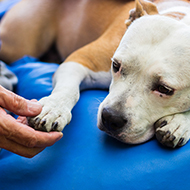
The charity is providing advice on the condition.
National veterinary care charity PDSA is raising awareness of pet diabetes for National Diabetes Week (13-17 June).
Nina Downing, PDSA veterinary nurse, explained to pet owners: “Diabetes is a disease that develops when your pet's body can't produce enough insulin to control their blood sugar level, causing it to become dangerously high.
“It usually develops when the body attacks the insulin producing cells in the pancreas, which can sometimes happen after pancreatitis. Obesity can also be a cause of diabetes in cats, and can make the condition harder to manage in dogs.
“If left untreated, diabetes can lead to a potentially life-threatening condition called ‘diabetic ketoacidosis’ (DKA).”
The charity has provided guidance for pet owners on diabetes, with advice on symptoms, treatment, routine and exercise.
Nina said: “Diabetes can be hard to spot, so it’s important to know the symptoms. One of the first major signs of diabetes in pets is drinking more than usual and, in turn, needing to urinate more often.
“You might notice an increased appetite, regular vomiting, or that your pet seems under the weather and less energetic. Some of these symptoms may develop slowly over time, so it’s always important to monitor your furry friend – the earlier you spot any changes and contact your vet, the better.”
“If your dog or cat is diagnosed with diabetes, your vet may prescribe once or twice daily insulin injections. They will demonstrate how to do this safely at home and can give any additional guidance you may need.
“Your vet may also advise introducing a controlled diet, which means feeding your pet specific types of food at the same times each day to help regulate their blood sugar levels.
“Alongside medical treatment, owners will need to take small steps after diagnosis to help our precious pets lead a fulfilling life. Diet and exercise are essential to any pet’s health and wellbeing, but this is especially important for dogs and cats with diabetes.
“Stick to a consistent feeding routine and avoid additional foods between meals as this can cause unpredictable changes in blood sugar.
“Replace extra treats with lots of fuss, play time and attention – they’ll appreciate this just as much as an unhealthy snack!
“Exercise can affect blood sugar levels, so diabetic dogs and cats will need a set amount, at set times each day.
“Suddenly increasing or decreasing your pet’s daily exercise could cause their blood sugars to change, so try to keep a steady routine each day and don’t push them too hard.”
Image (C) PDSA



 The Veterinary Medicines Directorate (VMD) is inviting applications from veterinary students to attend a one-week extramural studies (EMS) placement in July 2026.
The Veterinary Medicines Directorate (VMD) is inviting applications from veterinary students to attend a one-week extramural studies (EMS) placement in July 2026.